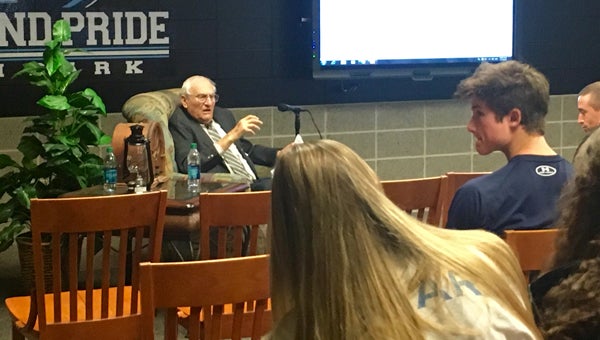Survivor tells SPHS students about terrors of the holocaust
Published 2:08 pm Wednesday, February 3, 2016

Holocaust survivor Max Steinmetz speaks to Spain Park students about his incarceration by the Nazis. (Reporter Photo/Molly Davidson)
By MOLLY DAVIDSON / Staff Writer
HOOVER—Max Steinmetz clearly remembers his time as holocaust prisoner 72041. The three-year-long nightmare claimed the lives of his mother, father, sister and brother. Steinmetz, now 91, recounted his story of struggle and survival to a group Spain Park High School social studies students on Feb. 3.
The nightmare started in 1942 when Steinmetz, a teenager at the time, and his family were forced out of their home by Nazis and into a ghetto along with numerous other Jews.
“Life completely changed from good to terrible,” Steinmetz said.
The ghetto was just the beginning. Several months later, Steinmetz and his family, along with hundreds of other Jews, were packed into freight cars bound for Auschwitz.
“We traveled for three days and three nights without stopping…without food, without medicine,” Steinmetz said, recalling the railroad cars packed to the limit with up to 300 people.
Upon arrival, Steinmetz came face-to-face with the infamous Nazi SS officer Dr. Josef Mengele as he sorted prisoners, sending some to work and others to their death. Steinmetz and his brother, Henry, were sent to work, however, his mother, father and 6-year-old sister did not join them.
“Dr. Josef Mengele decided who died and who survived,” Steinmetz said. “That was the last time I ever say my parents…or my sister.”
Steinmetz was sent to three different concentration camps while incarcerated by the Nazis. Life in the camps was grueling. Prisoners were given a slice of bread and black coffee each day, then sent to perform manual labor from building roads to digging trenches, Steinmetz said.
Prisoners’ names were replaced with numbers. Steinmetz told students his number was 72041 and his brother’s was 72042.
“They told us as of today we no longer had names,” Steinmetz said.
After years two years of food deprivation, squalid living conditions and manual labor, Steinmetz’s brother died in February 1945.
“(One morning) my brother said to me ‘I can’t get up,’” Steinmetz said. “If you could not go to work every morning there was a special unit (that picked up those who stayed behind)…Ten percent to 20 percent could not go, they were in the process of dying.”
When Steinmetz returned to the camp from working, his brother Henry was gone.
Steinmetz escaped from captivity in April 1945 when he ran away from his work group. He was sheltered by the wife of a high-ranking SS officer until liberation in May 1945.
Three years of Nazi incarceration reduced the 6-foot 1-inch Steinmetz to just 80 pounds, but he recovered, moved to America, found work and achieved an education. Steinmetz met his wife, Betty, in Birmingham. The two have three children, all of whom have college educations, a point of pride for Steinmetz.
“I’m very, very proud of that,” Steinmetz said. “I’ll tell you from experience, education is extremely important.”
Following the presentation, Steinmetz answered students’ questions and encouraged them to write him a note about what they learned and how his story touched them.
“If you would please jot me a note and tell me what did I tell you,” Steinmetz said. “You’ll be surprised to know how much I learn (from students).”









